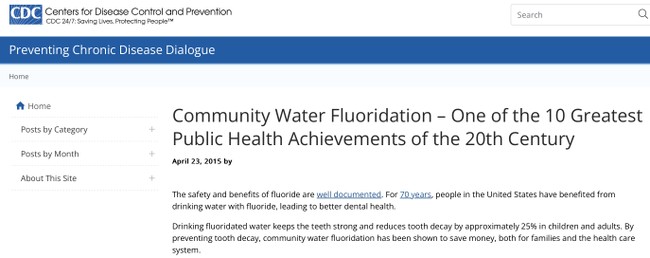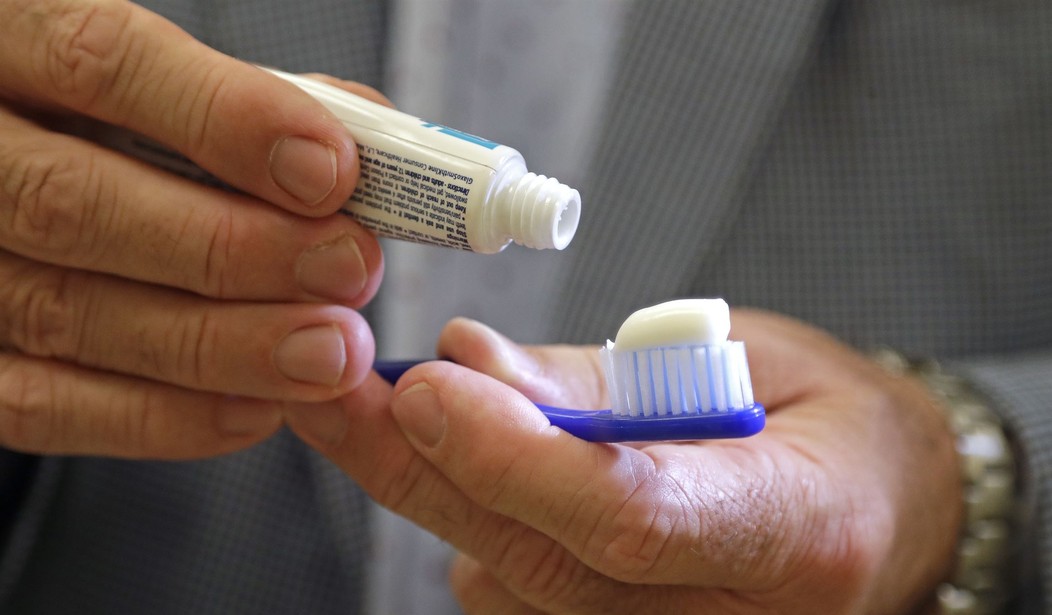I have long known that fluoridating water was a terrible idea, but I have been reluctant to write or even discuss this fact with people because the expert consensus was that anybody who opposed it was a kook.
The American Public Health Association says:
Community water fluoridation is recognized by the Centers for Disease Control and Prevention as one of the 10 great public health achievements of the 20th century. Water fluoridation has played a major role in lowering the rate of tooth decay in the U.S.
Except it turns out, as I and many others who have read the studies, that this assertion is nonsense, and dangerous nonsense at that.
Don't trust me? After an enormous amount of pressure and years of "study" (other countries have studied the issue and chosen NOT to fluoridate or to discontinue it), the National Institutes of Health have admitted that fluoride at the levels we ingest it is toxic and actually lowers IQ.
Check your child's toothpaste. Throw it out if it contains fluoride.
— Calley Means (@calleymeans) October 8, 2024
Below is from the NIH.
I cannot explain to you have damning and conclusive this evidence has to be for the government to admit that it lied to us like this.
Parents were ridiculed for asking questions... pic.twitter.com/1zEXeXeRVd
"One of the 10 great public health achievements of the 20th century" also happens to cause neurological damage to children.
 Oops.
Oops.
The NTP monograph concluded that higher levels of fluoride exposure, such as drinking water containing more than 1.5 milligrams of fluoride per liter, are associated with lower IQ in children. The NTP review was designed to evaluate total fluoride exposure from all sources and was not designed to evaluate the health effects of fluoridated drinking water alone. It is important to note, however, that there were insufficient data to determine if the low fluoride level of 0.7 mg/L currently recommended for U.S. community water supplies has a negative effect on children’s IQ.
The NTP uses 4 confidence levels - high, moderate, low, or very low - to characterize the strength of scientific evidence that associates a particular health outcome with an exposure. After evaluating studies published through October 2023, the NTP Monograph concluded there is moderate confidence in the scientific evidence that showed an association between higher levels of fluoride and lower IQ in children.
The determination about lower IQs in children was based primarily on epidemiology studies in non-U.S. countries such as Canada, China, India, Iran, Pakistan, and Mexico where some pregnant women, infants, and children received total fluoride exposure amounts higher than 1.5 mg fluoride/L of drinking water. The U.S. Public Health Service currently recommends 0.7 mg/L, and the World Health Organization has set a safe limit for fluoride in drinking water of 1.5 mg/L. The NTP found no evidence that fluoride exposure had adverse effects on adult cognition.
One problem we face is that fluoride is now in toothpaste, processed food made with fluoridated water, and other sources. The original studies that concluded that fluoride prevented tooth decay were pretty weak, but assuming that fluoride does, to some degree, strengthen teeth to prevent tooth decay, the effect is based entirely on exposure in the mouth. Flouride ingestion does nothing to strengthen teeth, and it can harm bones and teeth.
You have probably seen people with white and brown speckles on their teeth, which is caused by damage from overexposure to fluoride.
Ironically, the NIH has a paper on the damage caused to bones and teeth from excessive fluoride.
High systemic fluoride exposures can lead to skeletal fluorosis, a condition hallmarked by osteosclerosis, ligament calcifications, and often accompanying osteoporosis, osteomalacia, or osteopenia (Christie, 1980; Wang et al., 2007). Skeletal fluorosis can be complicated by malnutrition (Teotia and Teotia, 2008).
In other words, fluoridating toothpaste may or may not be effective in preventing tooth decay by washing over the teeth, but ingesting fluoride is taking a toxin into your body. At very low levels it may not cause any or much harm, but putting fluoride in the water for ingestion is grossly irresponsible. It causes harm and provides little to no benefit.
I don't use fluoridated toothpaste or mouthwash and haven't had a cavity in years. I have had root canals, but those are from teeth that were damaged by tooth grinding.
The point I want to make is not really about the wisdom of water fluoridation but rather about scientific "consensus." Opponents of fluoridation have been portrayed as ridiculous and dangerous conspiracy theorists, but they have been right all along. The UN, the CDC, the ADA, and all the experts have attacked and ridiculed critics of fluoridation, who have suffered from being "discredited" for saying true things.
Does that sound familiar? It should. We just saw the exact same thing over the past four years, and enormous damage was done to billions of people.
I am not opposed to people developing "expertise;" we need specialists who focus on vital issues and acquire specialized knowledge.
Rather, the cult of expertise is the problem. In many cases, expertise is really just unearned certainty. No expert should be certain of things to the point that they ridicule others, prevent dissent, and quash inquiry.
Experts also tend to have such specialized knowledge that they totally miss the big picture. Our "experts" in public health never considered collateral damage from even somewhat effective interventions. Not understanding the costs of school closure, they blithely harmed tens of millions of children for no real benefit.
Simply put, as often as not experts in positions of power often do much more harm than good. They may make for good advisors, especially if there are competing experts on a subject, but handing over power to them is a huge mistake.
"One of the 10 great public health achievements of the 20th century" causes neurological and physical damage to children.
Good job, experts!








Join the conversation as a VIP Member